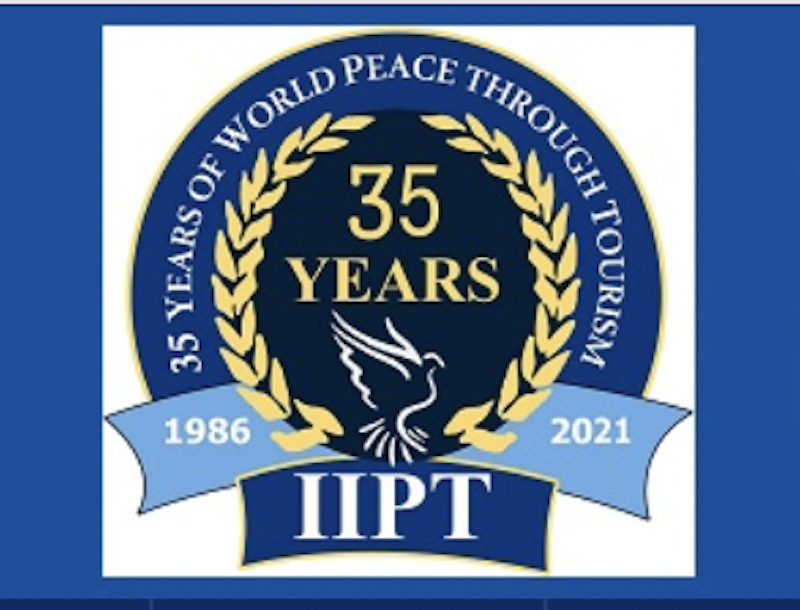. . SUSTAINABLE DEVELOPMENT . .
An article by Juergen T Steinmetz in eTurboNews
Family meetings are usually private, but the family of the International Institute for Peace through Tourism thinks tourism is a global family and you should be included.
Supporters, Board-members and followers of the International Institute for Peace Through Tourism (IIPT) organization met virtually last week as a “global family” meeting arranged by the World Tourism Network and eTurboNews.

Louis D’Amore founded IIPT 34 years ago and expressed his commitment to welcome 1000 peace parks. Currently, IIPT has established peace parks in every continent except Antarctica
The family meeting heard chapter updates from around the world including Jamaica, Australia, Iran, and welcomed a new chapter in the Maldives.
Family meetings are usually private, but the IIPT board decided to make last week’s virtual meeting public. Peace Through Tourism after all is a Global Family of peace-loving members of the travel and tourism industry anywhere.
IIPT family members attending included Dr. Taleb Rifai, former two-time secretary-general of the UNWTO, Ajay Prakash , VP & President of IIPT India, Kiran Yadov, VP and Co-founder IIPT India, Diana McIntyre, president of the Caribbean Chapter, Gail Parsonage, president IIPT Australia, Fabio Carbone, IIPT Ambassador at Large and President IIPT Iran, Philippe Francois, CEO World Association for Hospitality and Tourism Education& Training, Juergen Steinmetz, Founder World Tourism Network and CEO of the Travel News Group, Maga Ramasamy, President IIPT Indian Ocean Islands, Ms. Mmatsatsi, President IIPT South Africa, Bea Broda, film-maker, Mohamed Raadih , IIPT Maldives Chapter President, among others.
(continued in right column)
How can tourism promote a culture of peace?
(continued from left column)
The International Institute for Peace through Tourism (IIPT) was born in 1986, the International Year of Peace, with a vision of travel and tourism becoming the world’s first global peace industry and the belief that every traveler is potentially an “Ambassador for Peace.” The IIPT First Global Conference, Tourism: A Vital Force for Peace, Vancouver 1988, with 800 delegates from 68 countries was a transformative event. At a time that most tourism was ‘mass tourism’, the Conference first introduced the concept of ‘Sustainable Tourism’ as well as a new paradigm for a “Higher Purpose” of tourism that gives emphasis to the key role of tourism in fostering travel and tourism initiatives that contribute to international understanding; cooperation among nations; an improved quality of environment; cultural enhancement and the preservation of heritage; poverty reduction; reconciliation and healing wounds of conflicts; and through these initiatives, helping to bring about a peaceful and sustainable world. IIPT has since organized some 20 international conferences and global summits in different regions of the world with a focus on actual case studies that demonstrate and promote these values of tourism.
In 1990, IIPT pioneered the role of tourism in poverty reduction by identifying potential projects in four countries of the Caribbean and three in Central America. Following the U.N. Conference on Environment and Development (Rio Summit in 1992), IIPT developed the world’s first Code of Ethics and Guidelines for Sustainable Tourism and in 1993, conducted the world’s first international study on Codes of Conduct and Best Practices for Tourism and Environment. IIPT’s 1994 Montreal Conference: “Building a Sustainable World through Tourism” was the first major international conference on sustainable tourism. The Conference was instrumental in the World Bank beginning its support for tourism projects aimed at poverty reduction in developing nations. Other development agencies followed and by 2000, tourism’s role in poverty reduction became widely recognized.
The Amman Declaration resulting from IIPT’s Global Summit in Amman, Jordan 2000 was adopted as an official document of the United Nations. Similarly, the Lusaka Declaration on Sustainable Tourism Development, Climate Change and Peace, resulting from the IIPT Fifth African Conference, 2011, was adopted by UNWTO and broadly circulated. The Conference also resulted in a book publication: Meetng the Challenges of Climate Change to Tourism and was instrumental in the UNWTO 20th General Assembly being co-hosted by Zambia and Zimbabwe. The IIPT Global Symposium, 2015 in Johannesburg, South Africa honored the legacies of Nelson Mandela, Mahatma Gandhi and Martin Luther King, Jr. IIPT has also had featured events each year since 1999 at World Travel Market, London – the past four years at ITB, Berlin and several manor Chapter conferences and events in the Caribbean, Australia, India, Jordan, Malaysia and Iran.
In 1992, as part of Canada 125 celebrations commemorating Canada’s 125th birthday as a nation, IIPT conceived and implemented “Peace Parks across Canada.” 350 cities and towns from St. John’s, Newfoundland across five time zones to Victoria, British Columbia, dedicated a park to peace on October 8 as the nation’s Peace-Keeping Monument was being unveiled in Ottawa and 5,000 Peace Keepers passing in review. Of the more than 25,000 Canada125 projects, Peace Parks across Canada was said to be the “most significant.” Since then, IIPT international peace parks have been dedicated as a legacy of each of IIPT’s international conferences and global summits. Noteworthy IIPT International Peace Parks are located at Bethany Beyond the Jordan, site of Christ’s baptism; Victoria Falls, one of the seven natural wonders of the world; Ndola, Zambia, site of U.N. Secretary-General Dag Hammarskjold crash en route to a peace mission in the Congo; DMedellin, Colombia, dedicated on Opening Day of the UNWTO 21st General Assembly; Sun River National Park, China; and the Uganda Martyr’s Catholic Shrine, Zambia.